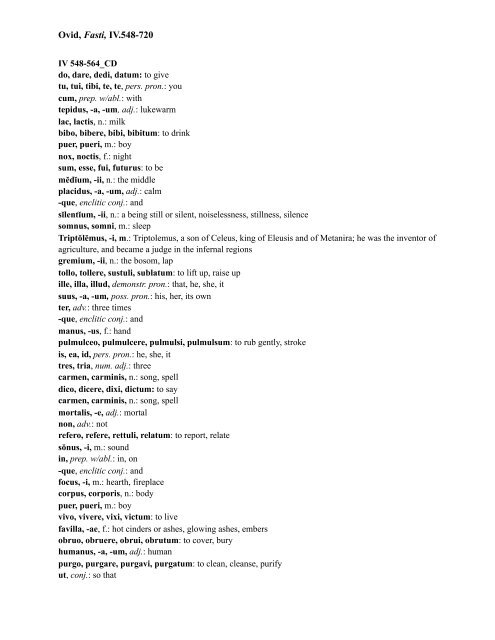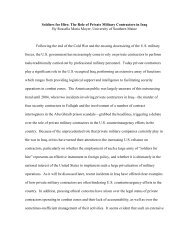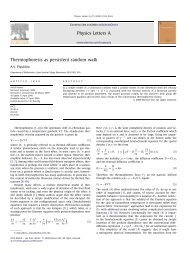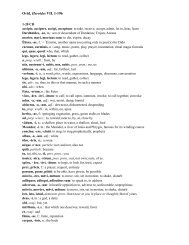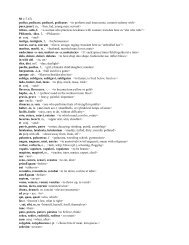Create successful ePaper yourself
Turn your PDF publications into a flip-book with our unique Google optimized e-Paper software.
<strong>Ovid</strong>, <strong>Fasti</strong>, <strong>IV.548</strong>-<strong>720</strong><br />
IV 548-564_CD<br />
do, dare, dedi, datum: to give<br />
tu, tui, tibi, te, te, pers. pron.: you<br />
cum, prep. w/abl.: with<br />
tepidus, -a, -um, adj.: lukewarm<br />
lac, lactis, n.: milk<br />
bibo, bibere, bibi, bibitum: to drink<br />
puer, pueri, m.: boy<br />
nox, noctis, f.: night<br />
sum, esse, fui, futurus: to be<br />
mĕdĭum, -ii, n.: the middle<br />
placidus, -a, -um, adj.: calm<br />
-que, enclitic conj.: and<br />
sĭlentĭum, -ii, n.: a being still or silent, noiselessness, stillness, silence<br />
somnus, somni, m.: sleep<br />
Triptŏlĕmus, -i, m.: Triptolemus, a son of Celeus, king of Eleusis and of Metanira; he was the inventor of<br />
agriculture, and became a judge in the infernal regions<br />
gremium, -ii, n.: the bosom, lap<br />
tollo, tollere, sustuli, sublatum: to lift up, raise up<br />
ille, illa, illud, demonstr. pron.: that, he, she, it<br />
suus, -a, -um, poss. pron.: his, her, its own<br />
ter, adv.: three times<br />
-que, enclitic conj.: and<br />
manus, -us, f.: hand<br />
pulmulceo, pulmulcere, pulmulsi, pulmulsum: to rub gently, stroke<br />
is, ea, id, pers. pron.: he, she, it<br />
tres, tria, num. adj.: three<br />
carmen, carminis, n.: song, spell<br />
dico, dicere, dixi, dictum: to say<br />
carmen, carminis, n.: song, spell<br />
mortalis, -e, adj.: mortal<br />
non, adv.: not<br />
refero, refere, rettuli, relatum: to report, relate<br />
sŏnus, -i, m.: sound<br />
in, prep. w/abl.: in, on<br />
-que, enclitic conj.: and<br />
focus, -i, m.: hearth, fireplace<br />
corpus, corporis, n.: body<br />
puer, pueri, m.: boy<br />
vivo, vivere, vixi, victum: to live<br />
favilla, -ae, f.: hot cinders or ashes, glowing ashes, embers<br />
obruo, obruere, obrui, obrutum: to cover, bury<br />
humanus, -a, -um, adj.: human<br />
purgo, purgare, purgavi, purgatum: to clean, cleanse, purify<br />
ut, conj.: so that
<strong>Ovid</strong>, <strong>Fasti</strong>, <strong>IV.548</strong>-<strong>720</strong><br />
ignis, ignis, m.: fire<br />
onus, oneris, n.: burden<br />
excutio, excutere, excussi, excussum: to shake out<br />
somnus, -i, m.: sleep<br />
stultē, adv.: foolishly, sillily<br />
pius, -a, -um, adj.: good, conscientious, affectionate, tender, kind<br />
mater, matris, f.: mother<br />
et, conj.: and<br />
amens, amentis, adj.: frantic<br />
quis, quid, interrog. pron.: who, which, what<br />
facio, facere, feci, factum: to do<br />
exclamo, exclamare, exclamavi, exclamatum: to cry out<br />
membrum, -i, n.: limb<br />
-que, enclitic conj.: and<br />
ab, prep. w/abl.: from<br />
ignis, ignis, m.: fire<br />
rapio, rapere, rapui, raptum: to snatch<br />
qui, quae, quod, rel. pron.: who, which, what<br />
dea, -ae, f.: goddess<br />
dum, conj.: while<br />
non, adv.: not<br />
sum, esse, fui, futurus: to be<br />
dico, dicere, dixi, dictum: to say<br />
scelero, scelerare, sceleravi, sceleratum: to pollute, defile<br />
sum, esse, fui, futurus: to be<br />
irrĭtus (inr-), -a, -um: vain, useless, without effect, ineffectual<br />
maternus, -a, -um, adj.: maternal<br />
sum, esse, fui, futurus: to be<br />
meus, mea, meum, poss. pron.: my, mine<br />
donum, -i, n.: gift<br />
metus, -us, m.: fear<br />
iste, ista, istud, demonstr. pron.: that, that (person or thing) near to you, that of yours<br />
quidem, adv.: indeed<br />
mortalis, -e, adj.: mortal<br />
sum, esse, fui, futurus: to be<br />
sed, conj.: but<br />
primus, -a, -um, adj.: first<br />
aro, arare, aravi, aratum: to plough<br />
et, conj.: both<br />
sero, serere, sevi, satum: to sow<br />
et, conj.: and<br />
colo, colere, colui, cultum: to cultivate<br />
praemium, -ii, n.: profit, reward<br />
tollo, tollere, sustuli, sublatum: to lift up; raise<br />
humus, -i, f.: earth, soil
<strong>Ovid</strong>, <strong>Fasti</strong>, <strong>IV.548</strong>-<strong>720</strong><br />
dico, dicere, dixi, dictum: to say<br />
et, conj.: and<br />
egredior, egredi, egressus sum: to go beyond, to pass out of, to leave<br />
nubes, -is, f.: cloud<br />
traho, trahere, traxi, tractum: to drag along<br />
in, prep.+acc.: into, to, towards<br />
-que, enclitic conj.: and<br />
draco, dracones, m.: snake, serpent, dragon<br />
transeo, transere, transivi, transitum: to go over to<br />
et, conj.: and<br />
aliger, aligera, aligerum, adj.: winged<br />
tollo, tollere, sustuli, sublatum: to lift up; to bear or carry away<br />
axis, -is, m.: chariot<br />
Ceres, -eris, f.: Ceres<br />
Sunium, -i, n.: the highly exposed promontory of Sunium in Attica<br />
expono, exponere, exposui, expositum: to expose<br />
Pīraea, -ōrum, n.: the celebrated port of Athens, 5 Roman miles from the city, connected by long walls<br />
tutus, -a, -um, adj.: safe, secure<br />
rĕcessus, -ūs, m.: departure<br />
linquo, linquere, linqui: to leave<br />
et, conj.: and<br />
in, prep. w/abl.: on<br />
dexter, dextra, dextrum, adj.: the right<br />
qui, quae, quod, pron.: who, which, what<br />
iaceo, iacere, iacui, iacitum: to lie<br />
ōra, -ae, f.: shore, coast, seacoast<br />
latus, lateris, n.: the side<br />
565-581_LD<br />
hinc, adv.: from this place, hence<br />
ĭnĕo, inire, -īvi and ĭi, -ĭtum: to go into, to enter a place<br />
Aegaeum, -i, n.: Aegean sea<br />
quō, adv.: where<br />
Cȳclădes, -um, f.: the Cyclades, islands lying in a circle round Delos, in the Ægean Sea, off the coast of<br />
the Peloponnesus<br />
aspĭcĭo, aspicere, aspexi, aspectum: to look to or upon<br />
omnĭs, e, adj.: all, every<br />
Ionium, -i, n.: the Ionian Sea, in the west of Greece<br />
-que, enclitic conj.: and<br />
răpax, -ācis, adj.: grasping, rapacious, ravenous<br />
Īcărĭum, -i, n.: the Icarian Sea, the part of the Ægean Sea named after Icarus<br />
-que, enclitic conj.: and<br />
lĕgo, legere, lēgi, lectum: to pass or sail by, to skirt, to coast along a shore, land, or place<br />
per, prep. with acc.: through<br />
-que, enclitic conj.: and
<strong>Ovid</strong>, <strong>Fasti</strong>, <strong>IV.548</strong>-<strong>720</strong><br />
urbs, urbis, f.: a walled city<br />
Asia, -ae, f.: Asia<br />
longus, a, um, adj.: long<br />
pĕto, petere, īvi and ĭi, ītum: to seek<br />
Hellespontus, -i, m.: the Sea of Helle, the Hellespont, so named after Helle, who was drowned in it<br />
dīversus (-vorsus), -a, -um: different, diverse, opposite<br />
-que, enclitic conj.: and<br />
locus, loci, m.: a place, spot<br />
altus, -a, -um: high, lofty, elevated<br />
pĕrerro, -are, -āvi, -ātum: to wander through, ramble over<br />
ĭter, ĭtĭnĕris, n.: a going, walk, journey<br />
nam, conj.: for<br />
modo, adv.: only; modo ... modo: now ... now, at one moment ... at another, sometimes ... sometimes<br />
tūrĭlĕgus, -a, -um, adj.: incense gathering<br />
Ārabs, -ăbis, acc. Gr. Arabas, m.: Arab<br />
modo, adv.: only; modo ... modo: now ... now, at one moment ... at another, sometimes ... sometimes<br />
dēspĭcĭo, -ere, -exi, -ectum: to look down upon<br />
Indi, -ōrum, m.: the inhabitants of India, Indians<br />
hinc, adv.: from this place, hence; hinc ... hinc: on this side ... on that side, here ... there<br />
Lĭbys, -yos, adj.: Libyan<br />
hinc, adv.: from this place, hence; hinc ... hinc: on this side ... on that side, here ... there<br />
Mĕrŏē, -ēs, f.: a large celebrated island of the Nile<br />
siccus, -a, -um, adj.: dry<br />
-que, enclitic conj.: and<br />
terra, -ae, f.: land, ground<br />
subsum, subesse: to be under, among<br />
nunc, adv.: now<br />
ădĕo, -ere, -ĭī, -ĭtum: to go to, approach<br />
Hespĕrĭus, -a, -um, adj.: of or situated towards the west, western, Hesperian<br />
Rhēnus, -i, m.: The Rhine<br />
Rhŏdănus, -i, m.: The Rhone<br />
-que, enclitic conj.: and<br />
Pădus, -i, m.: the Po, the principal river of Italy<br />
-que, enclitic conj.: and<br />
tu, tui, tibi, te, te, pers. pron.: you<br />
-que, enclitic conj.: and<br />
fŭtūrus, -a, -um: future<br />
parens, parentis, m.: parent<br />
Thybris, -is, m.: the Tiber<br />
pŏtens, -entis, adj.: able, mighty, powerful, potent<br />
aqua, aquae, f.: water<br />
quō, adv.: where<br />
fĕro, ferre, tŭli, lātum: to bear, carry<br />
immensus, a, um, adj.: immeasurable, boundless, endless, vast, immense<br />
sum, esse, fui: to be
<strong>Ovid</strong>, <strong>Fasti</strong>, <strong>IV.548</strong>-<strong>720</strong><br />
erro, errare, -āvi, -ātum: to wander<br />
dico, dicere, dixi, dictum: to say<br />
terra, -ae, f.: land, ground<br />
praetĕrĕo, ire, īvi, itum: to go by, to pass by; leave out, omit, take no notice of<br />
Cĕrēs, ĕris, f.: the daughter of Saturn and Ops<br />
nullus, nulla, nullum, adj.: not any, none<br />
in, prep. with abl.: in, on<br />
orbis, is, m.: world, globe<br />
locus, loci, m.: a place, spot<br />
erro, errare, -āvi, -ātum: to wander<br />
et, conj.: and; even<br />
in, prep. with abl.: in<br />
caelum, caeli, n.: the sky, heavens<br />
līquĭdus, -a, -um, adj.: flowing<br />
-que, enclitic conj.: and<br />
immunis, -e, adj.+gen.: not sharing or partaking in, free from, devoid of, without any thing<br />
pons, ntis, m.: a bridge across the river<br />
adlŏquor, adlŏqui, adlŏcūtus sum: to speak, address<br />
gĕlĭdus, -a, -um, adj.: icy cold<br />
proxĭmus, -a, -um, adj.: the nearest, next<br />
signum, -i, n.: a sign in the heavens, a constellation<br />
pŏlus, -i, m.: a pole<br />
Parrhăsis, -ĭdis, f. adj.: Parrhasian; poet. for Arcadian<br />
stella, -ae, f.: a star<br />
namque, conj.: for indeed, for truly, for<br />
omnĭs, -e, adj.: all, every<br />
nosco, noscere, nōvi, nōtum: to become acquainted with<br />
possum, posse, pŏtŭi: to be able<br />
aequŏrĕus, -a, -um, adj.: of or pertaining to the sea<br />
numquam, adv.: at no time, never<br />
cum, conj.: since<br />
sŭbĕo, -īre, -ĭi, -ĭtum: to go down, sink<br />
ăqua, -ae, f.: water<br />
Persĕphŏnē, -ēs, f.: Persephone<br />
nāta, -ae, f.: daughter<br />
mĭser, -ĕra, -ĕrum, adj.: wretched, unfortunate, miserable<br />
monstro, -are, -āvi, -ātum: to show, point out<br />
părens, -entis, f.: parent, mother<br />
dīco, dicere, dixi, dictum: to say, speak<br />
hīc, haec, hōc, pron. demonstr.: this<br />
Hĕlĭcē, -ēs, f.: the constellation of the Great Bear<br />
tālis, -e, adj.: such of a kind, nature, quality<br />
verbum, -i, n.: a word<br />
rĕfĕro, referre, rettŭli, rĕlātum: to say in return, to rejoin, answer, reply<br />
crīmen, -ĭnis, n.: a charge, accusation, reproach; fault, blame
<strong>Ovid</strong>, <strong>Fasti</strong>, <strong>IV.548</strong>-<strong>720</strong><br />
nox, noctis, f.: night<br />
văcŭus, -a, -um, adj.+abl.: empty, void, free, clear, devoid of, without<br />
sum, esse, fui: to be<br />
Sōl, Sōlis, m.: the Sun<br />
dē, prep.+abl.: down, about, concerning<br />
virgo, -ĭnis, f.: maiden, virgin<br />
răpĭo, -pere, -pŭi, -ptum: to seize, snatch, carry off, abduct<br />
582-598_KH<br />
consŭlo, -ere, -lŭi, -ltum: to consult, question<br />
qui, quae, quod, rel. pron.: who, which, what<br />
lātē, adv,: broadly, widely, extensively<br />
factum, -i, n.: that which is done, a deed, act, exploit<br />
diurnus, -a, -um, adj.: of or belonging to the day, diurnal<br />
video, videre, vidi, visum: to see<br />
Sol, solis, m.: the sun<br />
ădĕo, -ire. -ĭī, -ĭtum: to go to, approach<br />
qui, quae, quod, rel. pron.: who, which, what<br />
quero, quaere, quaesivi, quasitum: to seek<br />
aio, ait defective verb: to say<br />
ne, adv.: no, not; so that…not, lest<br />
vanus, -a, -um, adj.: empty, void, vacant; groundless, fruitless, vain<br />
lăbōro, -āre, -āvi, -ātum: to suffer, to labor under, to be oppressed, afflicted, or troubled with.<br />
nūpta, -ae, f.: a married woman, bride, wife<br />
Iūppĭter, Iŏvis, m.: Jove, Jupiter<br />
frater, -tris, m.: a brother<br />
tertius, -a, -um, adj.: the third<br />
regnum, -i, n.: kingship, dominion, kingdom, rule<br />
teneo, -ere, -ui, tentum: to hold, keep, have<br />
quĕror, queri, questus sum, dep. verb: to complain, lament, bewail<br />
diu adv.: a long time, long while, long<br />
-, sui, sibi, se, se, reflex. pron.: himself, herself, itself, themselves<br />
-cum, encl. prep.+abl.: with<br />
sīc, adv.: so/thus<br />
sum, esse, fui, futurus: to be<br />
affor, -āri, -atus sum: to speak to, accost, address<br />
Tonans, -antis, m.: Thunderer (epithet of Jupiter)<br />
maximus, -a, -um, adj. sup. of magnus, -a, -um, adj.: great, large<br />
-que, enclitic conj.: and<br />
in, prep.+abl.: in, on<br />
vultus, -us, m.: the expression, countenance, visage, face<br />
signum, signi, n.: sign, indication
<strong>Ovid</strong>, <strong>Fasti</strong>, <strong>IV.548</strong>-<strong>720</strong><br />
doleo, -ere, -ui, -itum: to feel pain, ache, lament, suffer<br />
sum, esse, fui, futurus: to be<br />
si, conj.: if<br />
mĕmor, -ŏris, adj.: mindful, unforgetting<br />
sum, esse, fui, futurus: to be<br />
dē, prep. + abl.: from<br />
qui, quae, quod, rel. pron.: who, what, which<br />
egō, mei, mihi, me, me person. pron.: I, me<br />
sum, esse, fui, futurus: to be<br />
Proserpina, -ae, f.: Proserpine, daughter of Ceres and Juppiter, wife of Pluto<br />
nata, -ae, f.: daughter<br />
dīmidium, -ii, n.: the half<br />
cūra, -ae, f.: care, concern<br />
debeo, -ere, -ui, -itum: to ought, owe<br />
habeo, habere, habui, habitum: to have, hold<br />
tuus, -a, -um possess. adj.: your<br />
orbis, -is, m.: the world<br />
pererro, -are, -avi, -atum: to wander through, to roam<br />
sōlus, -a, -um, adj.: alone, single, only<br />
sum, esse, fui, futurus: to be<br />
iniuria, -ae, f.: wrong, injurious, unlawful, unjust conduct<br />
factum, -i, n.: that which is done, a deed, act<br />
cognosco, -ere, -nōvi, -nĭtum: to recognize that which is already known, acknowledge, identify<br />
commissum, -i, n.: a transgression, offence, fault, crime<br />
praemium, -ii, n.: profit derived from booty, rewards<br />
raptor, -oris, m.: a robber, plunderer, abductor<br />
habeo, habere, habui, habitum: to have, hold<br />
at, conj.: but, yet, at least<br />
neque, conj.: and not, nor; neque…neque: neither…nor<br />
Persephone, -es, f.: Proserpine, daughter of Ceres<br />
dignus, -a, -um, adj.+abl.: worthy, deserving, suitable<br />
sum, esse, fui, futurus: to be<br />
praedo, -onis, m.: a plunderer, robber<br />
mărītus, -i, m.: a married man, husband<br />
nec, conj.: not, and not, also not, nor<br />
gener, -eri, m.: son-in-law<br />
hīc, haec, hōc, demonstr. pron.: this<br />
nos, nostrum/-i, nobis, nos, nobis, pers. pron.: we, us, our<br />
mos, moris, m.: custom<br />
paro, -are, -avi, -atum: to prepare, order, furnish<br />
sum, esse, fui, futurus: to be
<strong>Ovid</strong>, <strong>Fasti</strong>, <strong>IV.548</strong>-<strong>720</strong><br />
quis, quid, pron. interrog.: who? what?<br />
gravis, -e, adj.: heavy, weighty; grievous, painful, hard, harsh, severe, disagreeable, unpleasant<br />
victor, -oris, m.: a conqueror, victor, vanquisher<br />
Gyges, -is or ae, m.: a giant with a hundred arms<br />
captivus, -a, -um, adj.: taken prisoner, captive<br />
fero, ferre, tuli, latum: to bear, bring, carry; to endure, suffer<br />
quam, adv.: than<br />
nunc adv.: now<br />
tu, tui, tibi, te, te pers. pron.: you<br />
caelum, -i, n.: sky, heaven<br />
sceptrum, -i, n.: a royal staff, scepter<br />
teneo, -ere, -ui, tentum: to hold, keep, have<br />
fero, ferre, tuli, latum: to bear, bring, carry; to endure; to report<br />
vērum, adv.: but in truth, but not with standing, but yet<br />
impunis, -e, adj.: without punishment, safely, unpunished<br />
fero, ferre, tuli, latum: to bear, bring, carry; to carry off, take away by force, to plunder, spoil, ravage<br />
nos, nostrum/-i, nobis, nos, nobis, pers. pron.: we, us, our<br />
hīc, haec, hōc, demonstr. pron.: this<br />
patior, pati, passus sum: to bear, support, suffer, endure<br />
inultus, -a, -um, adj.: unavenged, unrevenged<br />
reddo, -ere, -didi, -ditum: to give back, return, restore<br />
et, conj.: and<br />
emendo, -are, -avi, -atum: to correct, improve, amend<br />
factum, -i, n.: that which is done, a deed, act, exploit<br />
prior, -oris, adj.: former, previous, prior<br />
novus, -a, -um, adj.: new, young, fresh<br />
Iūppĭter, Iŏvis, m.: Jove, Jupiter<br />
hīc, haec, hōc demon. pron.: this<br />
lenio, -ire, -ivi, -itum: to soften, alleviate, soothe, calm<br />
factum, -i, n.: that which is done, a deed, act, exploit<br />
-que, enclitic conj.: and<br />
excuso, -are, -avi, -atum: to excuse<br />
amor, -is, m.: love<br />
nec, conj.: not, and not, also not, nor<br />
gener, -eri, m.: son-in-law<br />
sum, esse, fui, futurus: to be<br />
nos, nostrum/-i, nobis, nos, nobis, pers. pron.: we, us, our<br />
ille, -a, -ud, demonstr. pron.: that, he, she, it<br />
pudendus, -a, -um, adj.: of which one ought to be ashamed, shameful, scandalous, disgraceful<br />
aio, ait defective verb: to say
<strong>Ovid</strong>, <strong>Fasti</strong>, <strong>IV.548</strong>-<strong>720</strong><br />
599-615 KL<br />
non adv.: not<br />
ego, mei, mihi, me, me pron.: I<br />
nōbĭlis, -e adj.: noble, well born, aristocratic; high-born, of noble birth<br />
pono, ponere, posui, positum: to put, place<br />
sum, esse, fui, futurum: to be<br />
ego, mei, mihi, me, me pron.: I<br />
regia, regiae f.: palace, court, residence<br />
caelum, caeli, n.: sky, heaven<br />
possido, possidēre, -sēdi, -sessum: to seize, to hold, to be master of, to possess<br />
alter, altera, alterum adj.: one (of two), second<br />
aqua, aquae f.: water; sea<br />
alter, altera, alterum adj.: one (of two), second<br />
inane, inanis n.: empty space of structure, hollow, void<br />
Chaos, abl. Chao (other cases not used) n.: Chaos, pit of Hell, underworld<br />
sed, conj.: but, yet<br />
si conj.: if<br />
forte adv.: by chance; perhaps<br />
tu, tui, tibi, te, te, pron.: you<br />
non adv.: not<br />
sum, esse, fui, futurum: to be<br />
mutabilis, mutabilis, mutabile adj.: changeable, inconstant<br />
pectus, pectoris, n.: the heart, breast<br />
sto, stare, stĕti, stătum: to stand<br />
-que enclitic conj.: and<br />
semel indec.: once<br />
iungo, iungere, iunxi, iunctum: to join, unite, connect<br />
rumpo, rumpere, rupi, ruptum: to break, to destroy<br />
vinclum, vincli n.: chain, bond<br />
torus, tori m.: couch, bed; marriage<br />
hic, haec, hoc pron.: this, these<br />
quoque adv.: likewise, also, too<br />
tempto, temptare, temptavi, temptatum: to test, to try, to urge<br />
siquidem conj.: accordingly, if indeed<br />
ieiunus, ieiuna, ieiunum adj.: fasting, abstinent, hungry<br />
remaneo, remanere, remansi, remansum: to stay behind, continue, remain<br />
si conj.: if<br />
minus adv.: less, not so well, not quite<br />
infernus, inferna, infernum adj.: lower, infernal, of the Lower Regions<br />
coniunx, coniugis m.: husband, spouse<br />
uxor, uxoris f.: wife<br />
sum, esse, fui, futurum: to be<br />
Tartăra, -ōrum, n.: the underworld, Tartarus<br />
iŭbĕo, ēre, iussi, jussum: to order, command, decree
<strong>Ovid</strong>, <strong>Fasti</strong>, <strong>IV.548</strong>-<strong>720</strong><br />
adeo, -ire, -ii, -itum: to go to, to approach<br />
sumo, sumere, sumpsi, sumptum: to take up<br />
caducifer, caducifera, caduciferum adj.: bearing a herald's staff, an epithet of Mercury<br />
ala, alae f.: wing<br />
spes, spei n.: hope<br />
-que enclitic conj.: and<br />
redeo, redire, redivii, reditum: to return, to go back<br />
cito, comp.citius, sup.citissime adv.: quickly, with speed, soon<br />
-que enclitic conj.: and<br />
video, videre, vidi, visum: to see<br />
certus, certa -um adj.: fixed, settled, certain<br />
refero, refere, rettuli, relatum: to return, bring back; to report, recount, relate<br />
rapio, rapere, rapui, raptum: to drag off, to snatch, to seize, abduct<br />
tres, trĭa, num. adj.: 3<br />
dico, dicere, dixi, dictum: to say<br />
solvo, solvere, solvi, solutum: to end, remove<br />
ieiunium, ieiunii n.: fasting, hunger<br />
granum, grani, n.: grain<br />
Punicus, Punica, Punicum adj.: Carthaginian, Punic; of the Phœnician color, purple-red<br />
qui, quae, quod rel. pron.: who, what, which<br />
lentus, lenta -um adj .: clinging, tough<br />
cortex, corticis n.: bark, cork, skin, rind<br />
pomum, pomi n.: fruit; Punicum pomum = pomegranate<br />
tego, tegere, texi, tectum: to cover, protect<br />
non adv.: not<br />
secus adv.: otherwise; differently<br />
indolesco, indolescere, indolui: to feel pain of mind, grieve<br />
quam, adv.: than<br />
si conj.: if<br />
modo, adv.: recently, just<br />
rapio, rapere, rapui, raptum: to drag off, to snatch, to seize, abduct<br />
maestus, maesta, maestum adj.: sad, unhappy<br />
parens, parentis, f.: mother<br />
longus, longa, longum adj.: long<br />
vix adv.: hardly, scarcely, barely<br />
-que enclitic conj.: and<br />
reficio, reficere, refeci, refectum: to restore, recover, refresh<br />
mora, morae f.: delay, pause<br />
sum, esse, fui, futurum: to be<br />
atque conj.: and too; and also, and besides, and even, and<br />
ita adv.: thus, so, therefore, accordingly, in this manner<br />
nec conj.: nor; and not<br />
nos, nostrum/-i, nobis, nos, nobis pron.: we, us<br />
caelum, caeli, n.: sky, heaven
<strong>Ovid</strong>, <strong>Fasti</strong>, <strong>IV.548</strong>-<strong>720</strong><br />
sum, esse, fui, futurum: to be<br />
habitabilis, habitabilis, habitabile adj.: habitable<br />
dico, dicere, dixi, dictum: to say<br />
Taenarius, -a, -um: of or belonging to Tænarus, a town in Laconia, with cavern nearby, the fabled<br />
entrance to the infernal regions; Taenarian<br />
recipio, recipere, recepi, receptum: to accept, receive, admit<br />
ego, mei, mihi, me, me pron.: I<br />
quoque adv.: likewise, also, too<br />
vallis, vallis, f.: valley, vale, hollow<br />
iubeo, iubere, iussi, iussum: to order<br />
et conj.: and<br />
facio, facere, feci, factum: to do<br />
sum, esse, fui, futurum: to be<br />
paciscor, pacisci, pactus sum: to make a bargain or agreement<br />
nisi conj.: if not, except, unless<br />
Iūppĭter, Iŏvis, m.: Jove, Jupiter<br />
sum, esse, fui, futurum: to be<br />
bis, indecl. adv.: twice<br />
tres, trĭa, num. adj.: 3<br />
ut conj.: that<br />
caelum, caeli, n.: sky, heaven<br />
mensis, mensis m.: month<br />
ille, illa, illud pron.: that, those<br />
sum, esse, fui, futurum: to be<br />
tum adv.: then, at that time<br />
demum adv.: finally, at last<br />
voltus, voltus m: face, expression<br />
-que enclitic conj.: and<br />
Ceres, Cereris, f.: Ceres<br />
animus, -i, m.: soul, heart, mind, reason<br />
-que enclitic conj.: and<br />
recipio, recipere, recepi, receptum: to recover<br />
616-632_ML<br />
impono, -ere, -posui, -positum +dat.: to place, put, set or lay into/upon/in<br />
-que enclitic conj.: and<br />
suus, sua, suum, possess. adj.: his, her its (own)<br />
spiceus, -a, -um, adj.: consisting of ears of corn<br />
serta, -ōrum, n.: wreaths (of flowers), garlands<br />
coma, comae f.: hair<br />
largus, -a, -um, adj.: abundant, copious, plentiful, large<br />
-que enclitic conj.: and<br />
provenio, -ire, -veni, -ventum: to come forth, be brought forth, be born<br />
cesso, -are, -avi, -atum: to delay, loiter; to be inactive, idle; to lie uncultivated, fallow
<strong>Ovid</strong>, <strong>Fasti</strong>, <strong>IV.548</strong>-<strong>720</strong><br />
messis, -is, f.: the harvested crops; harvest<br />
in, prep. w/abl.: in, on<br />
arvum, -i, n.: an arable field, cultivated land, a field, ploughed land<br />
et, conj.: and<br />
vix, adv.: with difficulty, hardly, scarcely<br />
congero, -ere, -gessi, -gestum: to bear, carry, bring together, collect<br />
area, -ae, f.: a piece of level ground, a vacant place; a threshing floor<br />
capio, -ere, cepi, captum: to capture, seize, take<br />
ops, ŏpis, f.: riches, wealth<br />
albus, -a, -um, adj.: white<br />
decet, -ere, -cuit: it is becoming, suitable, proper, fitting; it suits, looks good on<br />
Ceres, -eris, f.: goddess of agriculture (corn, fruits)<br />
vestis, -is, f.: clothing<br />
Cĕrĕālĭa, -ium, n.: the festival of Ceres, celebrated on the 10th of April,<br />
albus, -a, -um, adj.: white<br />
sumo, -ere, sumpsi, sumptum: to take up, lay hold of, assume, put on, wear<br />
nunc adv.: now<br />
pullus, -a, -um, adj.: dark-colored, blackish-gray, dusky, dark gray<br />
vellus, -eris, n.: wool shorn off, fleece, wool<br />
ūsus, -ūs, m.: the use or using of any thing<br />
absum, abesse, afui, afuturum: to be away, to be absent; not to be suitable, proper, or fit for<br />
G= the seventh nundinal day (Romans had a market week of 8 days, labeled A-H)<br />
EID= Eidus, -ŭum, f.: one of the three days in each month from which the other days were reckoned in<br />
the Roman calendar, the Ides; it fell upon the fifteenth day of March, May, July, and October; upon the<br />
thirteenth day in the remaining months<br />
NP= nefastus piaculum dies: a day on which judgment could not be pronounced, or assemblies of the<br />
people be held; may refer to special religious rite piaculum (denotes religious status of day)<br />
occupo, -are, -avi, -atum: to take possession of, seize, occupy<br />
Āprīlis, -is, m.: the month of April<br />
Idus, -uum, f.: one of the three days in each month from which the other days were reckoned in the<br />
Roman calendar, the Ides<br />
cognomen, -inis, n.: a name added to the nomen, a Roman surname, family name, epithet<br />
Victor, -oris, m.: a conqueror, victor<br />
Iūppĭter, Iŏvis, m.: Jove, Jupiter<br />
hic, haec, hoc, demonstr. pron.: this<br />
ille, illa, illud, demonstr. pron.: that, he, she, it<br />
sum, esse, fŭi, futurum: to be<br />
do, dare, dedi, datum: to give<br />
templum, -i, n.: a temple<br />
dies, -ei, f.: day<br />
hic, haec, hoc, demonstr. pron.: this<br />
quoque conj.: likewise, also<br />
ni, adv.: not, that not; if…not<br />
fallo, -ere, fĕfelli, falsum: to deceive, trick, dupe, cheat, disappoint<br />
populus, -i, m.: the people
<strong>Ovid</strong>, <strong>Fasti</strong>, <strong>IV.548</strong>-<strong>720</strong><br />
dignus, -a, -um, adj.: deserving, worthy, suitable, fitting<br />
noster, nostra, nostrum, poss. adj.: our, our own, of us<br />
atrium, -ii, n.: fore-court, hall, entrance room, entry<br />
Libertas, -atis, f.: the goddess of Liberty, whose temple on the Aventine Hill was founded by the father of<br />
Tiberius Gracchus in the second Punic war; in the atrium of this temple the census-tables were preserved<br />
coepĭo, -ere, coepi, coeptum: to begin<br />
habeo, habere, habui, habitum: to have<br />
suus, sua, suum, possess. adj.: his, her its (own)<br />
H= the eighth nundinal day (Romans had a market week of 8 days, labeled A-H)<br />
N= nefastus dies: a day on which judgment could not be pronounced, or assemblies of the people be held<br />
(denotes religious status of day)<br />
lux, lucis, f.: light, daylight, dawn<br />
sequor, sequi, sĕcūtus sum: to follow<br />
tūtus, -a, -um: well seen to or guarded; safe, secure, out of danger<br />
peto, petere, petivi, petitum: to seek<br />
nauita, -ae, m.: sailor, seaman<br />
portus, -us, m.: a harbor, port<br />
ventus, -i, m.: wind<br />
ăb, ā, prep.+abl.: from, away from, by<br />
occasus, -us, m.: a falling, a going down<br />
grando, -inis, f.: hail; a hailstorm<br />
miscĕo, miscere, miscŭi, mixtum +abl.: to mix, blend, intermingle<br />
sum, esse, fŭi, futurum: to be<br />
scilicet, adv. it is evident; of course, certainly<br />
ut, adv.: as, just as<br />
sum, esse, fŭi, futurum: to be<br />
tamen, conj.: yet, nevertheless<br />
hic, haec, hoc, demonstr. pron.: this<br />
Mutinensis, -e, adj.: of or belonging to Mutina, a city in Cispaline Gaul; refers to battle between Antony<br />
and Octavian<br />
Caesar, -ăris, m.: Caesar (Augustus)<br />
grando, -inis, f.: hail; a hailstorm<br />
militia, -ae, f.: military service, warfare, war; the soldiery, military<br />
percello, -ere, -culi, -culsum: to beat down, throw down; to overturn, upset<br />
arma, -ōrum, n.: defensive armour, shield, arms<br />
suus, sua, suum, possess. adj.: his, her its (own)<br />
A= the first nundinal day (Romans had a market week of 8 days, labeled A-H)<br />
FORD= fordis caedendis, i.e. Fordĭcīdĭa, the sacrifice of a cow that is with calf, which (accd. to Varro)<br />
was performed on the 16th of April, in honor of Tellus<br />
NP= nefastus piaculum dies: a day on which judgment could not be pronounced, or assemblies of the<br />
people be held; may refer to special religious rite piaculum (denotes religious status of day)<br />
B= the second nundinal day (Romans had a market week of 8 days, labeled A-H)<br />
N= nefastus dies: a day on which judgment could not be pronounced, or assemblies of the people be held<br />
(denotes religious status of day)<br />
tertius, -a, -um, num. adj.: the third
<strong>Ovid</strong>, <strong>Fasti</strong>, <strong>IV.548</strong>-<strong>720</strong><br />
post, prep. +acc.: after<br />
Venus, Veneris, f.: Venus, goddess of love.<br />
cum, adv.: when<br />
lux, lucis, f.: light<br />
surgo, -ere, surrexi, surrectum: to lift or raise up, erect, elevate; rise, ascend<br />
Idus, -uum, f.: one of the three days in each month from which the other days were reckoned in the<br />
Roman calendar, the Ides<br />
pontifex, -ficis, m.: a Roman high-priest, pontiff, pontifex<br />
fordus, -a, -um, adj.: with young, pregnant<br />
săcrum, -i, n.: something consecrated; a holy or sacred thing; a sacrifice<br />
lito, -are, -avi, -atum: to make an offering, sacrifice under favorable auspices, to obtain favorable omens<br />
bos, bovis, f.: cow<br />
forda, -ae, f.: a cow that is with calf<br />
fero, ferre, tuli, latum: to bear, bring, carry; report, say<br />
bos, bovis, m./f.: ox, bull, cow<br />
sum, esse, fŭi, futurum: to be<br />
fecundus, -a, -um, adj.: fruitful, fertile<br />
-que enclitic conj.: and<br />
dico, dicere, dixi, dictum: to say, tell<br />
fero, ferre, tuli, latum: to bear, bring, carry; report, say<br />
hinc, adv.: from this place, hence<br />
etiam conj.: and also<br />
fetus, -a, -um, adj.: pregnant, breeding, fruitful, productive<br />
nomen, nominis, n.: name<br />
habeo, habere, habui, habitum: to have<br />
puto, putare, putavi, putatum: to think<br />
633-649_AO<br />
nunc adv.: now<br />
gravidus, -a, -um, adj.: pregnant, with child, with young<br />
pecus, pecudis, m.: a single head of cattle, a beast, animal<br />
sum, esse, fui, futurum: to be<br />
gravidus, -a, -um, adj.: pregnant, with child, with young<br />
quoque, adv. indecl.: also, too<br />
semen, seminis, n.: seed<br />
terra, -ae, f.: the earth<br />
tellus, telluris, f.: the earth, the globe<br />
plenus, plena, plenum adj.: full; big, with child, pregnant<br />
victima, -ae, f.: a beast for sacrifice, a sacrifice, victim<br />
plenus, plena, plenum adj.: full; big, with child, pregnant<br />
do, dare, dedi, datum: to give<br />
pars, -tis, f.: a part, some<br />
cado, cadere, cecidi, casum: to be driven or carried by one’s weight from a higher to a lower point, fall<br />
down, sink, fall
<strong>Ovid</strong>, <strong>Fasti</strong>, <strong>IV.548</strong>-<strong>720</strong><br />
arx, arcis, f.: a stronghold, castle, citadel<br />
Iūppĭter, Iovis, m.: Juppiter, Jove<br />
ter, adv.: three times<br />
denae, -arum, f.pl.: ten each, ten at a time<br />
curia, -ae, f.: a curia or court, one of the thirty parts into which Romulus divided the Roman people, ten<br />
for each of the three tribes<br />
vacca, -ae, f.: a cow<br />
accipio, accipere, accipi, acceptum: to take, receive, accept, admit<br />
ĕt, conj.: and<br />
largus, -a, -um, adj.: abundant, plentiful, large, much<br />
spargo, -ere, -si, -sum: to strew, throw here and there, cast about, scatter, sprinkle<br />
cruor, cruoris, m.: blood, a stream of blood<br />
madeo, madere, madui: to be wet, drip, flow<br />
ast, conj.: but, yet<br />
ubi, adv.: in which place, where; when, whenever, as soon as, as<br />
viscer, visceris, n.: innermost part of the body, heart, vitals<br />
vitulus, -i, m.: a calf<br />
rapio, rapere, rapui, raptum: to seize and carry off, snatch, tear, drag away<br />
minister, ministri, m.: a priest’s attendant<br />
seco, secare, secui, sectum: to cut, cut off or out, amputate, operate on<br />
-que, enclitic conj.: and<br />
fumosus, -a, -um, adj.: full of smoke, smoking, smoky<br />
exta, extorum, n, pl.: the most prominent of the internal organs: heart, lungs, liver<br />
do, dare, dedi, datum: to give<br />
focus, -i m.: fire-place, hearth<br />
ignis, -is, m.: fire<br />
cremo, cremare, cremavi, crematum: to burn, consume by fire<br />
vitulus, -i, m.: a calf<br />
qui, quae, quod, rel.pron.: who, what, which<br />
natus, -us, m.: a growing, growth, (esp. reference to age, birth, age, years)<br />
maximus, -a, -um, adj.: greatest, largest<br />
Virgo, Virginis, f.: a maid, maiden, virgin; Vestal Virgin<br />
sum, esse, fui, futurum: to be<br />
lux, lucis, m.: light; the light of day, daylight, day<br />
Pales, Palis, f.: goddess of shepherds<br />
populus, -i, m.: the people<br />
purgo, purgare, purgavi, purgatum: to make clean or pure, cleanse, purify<br />
ut, conj.: so that<br />
ille, -a, -ud, demonstr. pron.: that; he, she, it<br />
cinis, cineris, m.: ashes<br />
rex, regis, m.: a ruler, king<br />
Numa, -ae, f.: Numa Pompilius, the second king of Rome<br />
fructus, -us, m.: proceeds, produce, product, fruit<br />
non, adv.: not
<strong>Ovid</strong>, <strong>Fasti</strong>, <strong>IV.548</strong>-<strong>720</strong><br />
respondeo, respondere, respondi, responsum: to offer/present in return, promise a thing in return for<br />
something else<br />
lăbor, -ōris, m.: labor, toil, exertion<br />
inritus, -a, -um, adj.: ineffective, useless<br />
decipio, decipere, dicepi, deceptum: to catch, ensnare, deceive, cheat<br />
votum, -i, n.: a solemn promise made to some deity, a vow<br />
colo, colere, colui, cultum: to cultivate, till, tend<br />
sum, esse, fui, futurum: to be<br />
nam, conj.: for<br />
modo adv.: only, recently<br />
siccus, -a, -um, adj.: dry<br />
sum, esse, fui, futurum: to be<br />
gelidus, -a, -um, adj.: icy cold, frosty<br />
Aquilo, Aquilonis, m.: the North Wind<br />
annus, -i, m.: a year<br />
nunc adv.: now; then<br />
ager, agri, m.: territory, field<br />
assiduus, -a, -um, adj.: constant, regular, incessant<br />
luxurio, luxurare, luxuravi, luxuratum: to be rank, luxuriant<br />
aqua, aquae, f.: water<br />
saepe, adv.: often<br />
Ceres, -eris, f.: goddess of agriculture (corn, fruits)<br />
primus, -a, -um, adj.: the first, foremost, conspicuous<br />
dominus, -i, m.: a master, ruler, owner<br />
fallo, fallere, fefelli, falsum: to deceive, trick, dupe, cheat<br />
in, prep.w/abl.: in, on<br />
herba, herbae, f.: herb, grass; springing vegetation<br />
et, conj.: and<br />
levis, -e: light, thin, slight, smooth; easy<br />
obsesso, obsidere, obsedi, obsessus: to blockade, besiege, invest, take possession of<br />
sto, stare, steti, statum: to stand, remain standing, stand still<br />
avena, -ae, f.: wild oats (a weed)<br />
solum, -i, n.: ground, soil<br />
et, conj.: and<br />
pecus, pecudis, m.: a single head of cattle, a beast, animal<br />
ante prep.+acc.: before<br />
dies, -ei, f.: day<br />
partus, -us, m.: a bearing, birth<br />
edo, edere, edidi, editum: to give out, put forth, bring forth<br />
acerbus, -a, -um, adj.: unripe, crude, not yet ready, unfinished, premature<br />
agna, -ae, f.: a ewe lamb<br />
-que, enclitic conj.: and<br />
nascor, nasci, natus sum: to be born<br />
saepe, adv.: often<br />
neco, necare, necavi, necatum: to kill, slay, put to death, destroy
<strong>Ovid</strong>, <strong>Fasti</strong>, <strong>IV.548</strong>-<strong>720</strong><br />
ovis, -is, f.: a sheep, ewe<br />
silva, -ae, f.: a wood, forest, woodland<br />
vetus, veteris, adj.: old, aged, ancient, of long standing<br />
nullus, nulla, nullum adj.: no, none<br />
-que, enclitic conj.: and<br />
diu, adv.: a long time, long while, long<br />
violo, violare, violavi, violatum: to treat with violence, injure, dishonor, outrage, violate<br />
securis, -is, f.: an axe or hatchet<br />
650-666_MO<br />
sto, stare, stĕti, stătum: to stand, to stand upright<br />
Maenălĭus, -a, -um, adj.: of or belonging to Mænalus (a range of mountains in Arcadia, extending from<br />
Megalopolis to Tegea, and sacred to Pan), Mænalian<br />
sacer, sacra, sacrum, adj.: holy, sacred<br />
rĕlinquo, -ere, -līqui, -lictum: to leave behind; let remain, leave, pass.: to be left, to remain<br />
dĕus, -i, m.: a god<br />
ille, -a, -ud demonstrative pron.: that, he, she, it<br />
do, dăre, dĕdi, dătum: to give<br />
tăcĭtus, -a, -um: silent, noiseless, quiet<br />
ănĭmus, -i, m.: the rational soul, mind<br />
rēsponsum, -i, n.: an answer, response, oracle<br />
quĭētus, -a, -um: at rest, calm, quiet, tranquil; resting, sleeping<br />
nox, noctis, f.: night<br />
hīc, adv,: in this place, here, on this occasion, at this time<br />
gĕmĭnus, -a, -um, adj.: born at the same time, twin-born, twin<br />
rex, rēgis, m.: a ruler, a king<br />
Numa, -ae, m.: Numa Pompilius, second king of Rome<br />
macto, -are, -āvi, -ātum: to offer, sacrifice, immolate<br />
ŏvis, -is, f.: a sheep<br />
prīmus, a, -um, adj.: the first, first<br />
cădo, cadere, cĕcĭdi, cāsum: to fall down, to die<br />
Faunus, -i, m.: a mythic son of Picus, grandson of Saturn and father of Latinus, king of Latium; he<br />
instituted tillage and grazing and after death was the protecting deity of agriculture and of shepherds<br />
lēnis, e, adj.: soft, smooth, mild, gentle, easy, calm<br />
cădo, cadere, cĕcĭdi, cāsum: to fall down, die<br />
alter, -tĕra, -tĕrum, adj.: the other of the two, the other, one of the two<br />
Somnus, -i, m.: Sleep<br />
sterno, sternere, strāvi, strātum: to spread out, stretch out, extend<br />
in prep.: in, within<br />
dūrus, -a, -um, adj.: hard<br />
vellus, -ĕris, n.: wool shorn off, a fleece<br />
ŭterque, utrăque, utrumque: each (of two), either, each one, one as well as the other, both<br />
sŏlum, -i, n.: the lowest part, the bottom, ground, base, foundation<br />
bis, adv.: twice<br />
căpŭt, -ĭtis, n.: the head
<strong>Ovid</strong>, <strong>Fasti</strong>, <strong>IV.548</strong>-<strong>720</strong><br />
intonsus, -a, -um: unshorn<br />
fontānus, -a, -um, adj.: of or from a spring or fountain<br />
spargo, -gere, -si, -sum: to sprinkle, spatter, moisten<br />
unda, -ae, f.: water<br />
bis, adv.: twice<br />
suus, -a, -um, poss. pron.: his own, her own, its, theirs<br />
fāgĭnĕus, -a, -um, adj.: of beech, breechen<br />
tempŏra, -um, n. pl.: the temples of the head<br />
frons, -dis, f.: a leafy branch, foliage<br />
prĕmo, -emere, -essi, -essum: to press<br />
ūsus, -ūs, m.: the use or using, a practice or exercise<br />
absum, abesse, āfui, āfŭtārus: to be away from, be absent<br />
Venus, Veneris, f.: the goddess of love, sex<br />
neque, adv.: not, and not, also not neque…nec: neither…nor<br />
fas, indecl. n.: right, proper, allowable, lawful, fit, permitted<br />
ănĭmāl, - ālis, n..: animal<br />
mensa, -ae, f.: a table<br />
pōno, ponere, pŏsŭi, pŏsĭtum: to put or set down, to put, place, lay<br />
neque, adv.: not, and not, also not neque…nec: neither…nor<br />
dĭgĭtus, -i, m.: a finger<br />
ānŭlus, -i, m.: a ring for the finger or a seal-ring<br />
ullus, -a, -um, dim. adj.: any, any one<br />
insum, -esse, -fui +dat.: to be in or upon<br />
vestis, -is, f.: covering for the body, clothes, clothing, attire, vesture<br />
rŭdis, e, adj.: unwrought, rough, raw<br />
tĕgo, -gere, -xi, -ctum: to cover<br />
supra, prep.+acc.: above, over.<br />
nŏvus, -a, -um, adj.: new, fresh, recent<br />
vellus, -ĕris, n.: wool shorn off, a fleece<br />
corpus, -ŏris, n.: the body<br />
pōno, ponere, pŏsŭi, pŏsĭtum: to put or set down, to put, place, lay<br />
ădōro, -are, -āvi, -ātum: to speak to or accost, to address; to beseech, supplicate, implore<br />
per, prep. w/ acc.: through, by, by means of<br />
suus, -a, -um, poss. pron.: his own, her own, its, theirs<br />
verbum, -i, n.: a word, language, discourse, conversation<br />
dĕus, -i, m.: a god<br />
intĕrĕā, adv.: meanwhile, in the meantime, in the interim<br />
plăcĭdus, -a, -um, adj.: gentle, quiet, still, calm, mild, peaceful<br />
redimio, -ire, -ii, -itum: to crown, wreath; to surround, encircle<br />
păpāver, -ĕris, n.: the poppy<br />
frons, frontis, f.: the forehead, brow, front<br />
nox, noctis, f.: night<br />
venio, venire, veni, ventum: to come<br />
et, conj.: and<br />
-sui, sibi, se, se, reflex. pron.: himself, herself, itself, themselves
<strong>Ovid</strong>, <strong>Fasti</strong>, <strong>IV.548</strong>-<strong>720</strong><br />
-cum, encl. prep.+abl.: with<br />
somnĭum, -ii, n.: a dream, sleep<br />
nĭger, -gra, -grum, adj.: black, sable, dark, dusky<br />
trăho, -here, -xi, -ctum: to draw, drag or haul, to drag along, draw forth<br />
Faunus, -i, m.: a mythic son of Picus, grandson of Saturn and father of Latinus, king of Latium; he<br />
instituted tillage and grazing and after death was the protecting deity of agriculture and of shepherds<br />
adsum, -esse, -fui, -futurus: to be at or near something, to be present<br />
ŏvis, -is, f.: a sheep<br />
-que, enclitic conj.: and<br />
prĕmo, -emere, -essi, -essum: to press<br />
pēs, pĕdis, m.: a foot of man or beast<br />
vellus, -ĕris, n.: wool shorn off, a fleece<br />
dūrus, -a, -um, adj.: hard<br />
ēdo, -dere, -dĭdi, -dĭtum: to give out, put forth, bring forth<br />
a, ab, prep. w/ abl.: from<br />
dexter, -tĕra, -tĕrum, adj.: to the right, on the ride side, right<br />
tālis, e, adj.: such, of such a kind, nature or quality<br />
verbum, -i, n.: a word, language, discourse, conversation<br />
tŏrus, -i, m.: couch, bed<br />
mors, -tis, f.: death<br />
bōs, bŏvis, m.: an ox, bull<br />
tu, tui, tibi, te, te pers. pron.: you<br />
rex, rēgis, m.: a ruler, a king<br />
Tellus, -uris, f.: Earth<br />
plāco, -are, -āvi, -ātum: to reconcile, placate<br />
dŭŏ, -ae, -ŏ, num. adj.: two<br />
do, dăre, dĕdi, dătum: to give<br />
săcra, -orum, n. pl.: sacred rites, religious worship, religion<br />
ănĭma, -ae, f.: soul, life<br />
unus, -a, -um, num. adj.: one, a single<br />
iŭvenca, -ae, f.: a young cow, heifer<br />
dŭŏ, -ae, -ŏ, num. adj.: two<br />
667-684_DP<br />
excutio, -cussare, -cussi, -cussum: to shake out or off, to cast out, drive out<br />
terror, -ōris, m.: great fear, affright, dread, alarm, terror<br />
quĭes, -ētis, f.: quiet, rest, repose, sleep<br />
Numa, -ae, m.: Numa Pompilius, second king of Rome<br />
video, videre, vidi, visum: to see<br />
revolvo, -volvere, volvi, volutum: to brood or reflect upon<br />
et, conj.: and<br />
-, sui, sibi, se, se, reflex. pron.: himself, herself, itself, themselves<br />
-cum, prep. + abl.: with<br />
ambages, is, f.: a going round; obscurity, ambiguity<br />
caecus , -a, -um: blind, obscure, uncertain, vague
<strong>Ovid</strong>, <strong>Fasti</strong>, <strong>IV.548</strong>-<strong>720</strong><br />
-que, enclitic conj.: and<br />
iussum, -i, n.: an order, command<br />
refero, refere, rettuli, relatum: to repeat to one's self, call to mind<br />
expedio, -ire, -ivi, -itum: to extricate, set free; help, help through, set right<br />
erro, errare, -avi, -atum: to wander<br />
nemus, nemoris, n.: wood, forest<br />
grātus, -a, -um: beloved, dear, acceptable, pleasing, agreeable<br />
coniunx, -is, f.: spouse, wife<br />
et, conj.: and<br />
dico, -ere, dixi, dictum: to say, call<br />
gravidus, -a, -um, adj.: pregnant with child<br />
posco, poscere, poposci: to beg, demand, request; pass.: to be asked for something<br />
exta, extorum, n., pl.: the most prominent of the internal organs, heart, lungs, liver<br />
bos, bovis, f.: cow<br />
exta, extorum, n., pl.: the most prominent of the internal organs, heart, lungs, liver<br />
bos, bovis, f.: cow<br />
gravidus, -a, -um, adj.: pregnant with child<br />
do, dare, dedi, datum: to give<br />
fecundus, -a, -um, adj.: fruitful, fertile<br />
annus, –i, m.: a year<br />
provenio, -venire, -veni, -ventum: to come forth, appear<br />
et, conj.: and<br />
fructus, -us, m.: produce, product, fruit<br />
terra, -ae, f.: earth, land, ground, soil<br />
pecus, pecudis, f.: sheep, animal<br />
-que, enclitic conj.: and<br />
fero, ferre, tuli, latum: to bear, bring<br />
hic, haec, hoc, pron. demonstr.: this, these<br />
quondam, adv.: at one time, once<br />
Cythĕrēa, -ae, f.: Venus<br />
dies, diei, f.: a day<br />
prŏpĕranter, adv.: hastily, speedily, quickly<br />
eo, ire, ivi, ii: to go<br />
iubeo, -ere, iussi, iussum: to order<br />
et, conj.: and<br />
admitto, admittere, admisi, admissum: to let go or run, to give loose reins to<br />
praecipito, -are, -avi, -atum: to hasten, hurry<br />
equus, equi, m.: a horse<br />
ut, conj.: so that<br />
titulus, tituli, m.: title;<br />
imperium, -ii, n.: a command, order titulum imperii = imperator<br />
cum, conj.: since, when<br />
prīmum, adv.: at first, first, in the first place, in the beginning cum primum: as soon as ever, as soon as<br />
lux, lucis, f.: light<br />
sĕquens, entis, adj.: next, next following in order
<strong>Ovid</strong>, <strong>Fasti</strong>, <strong>IV.548</strong>-<strong>720</strong><br />
Augustus, -i, m.: Augustus<br />
iuvenis, -is, adj.: young, youthful<br />
prosperus, -a, -um, adj.: favorable, fortunate, prosperous<br />
belli, bellum, n.: war<br />
do, dare, dedi, datum: to give<br />
C= the third nundinal day (Romans had a market week of 8 days, labeled A-H)<br />
N= nefastus dies: a day on which judgment could not be pronounced, or assemblies of the people be held<br />
(denotes religious status of day)<br />
D= the fourth nundinal day (Romans had a market week of 8 days, labeled A-H)<br />
N= nefastus dies: a day on which judgment could not be pronounced, or assemblies of the people be held<br />
(denotes religious status of day)<br />
sed, conj.: but<br />
iam, adv.: now<br />
praetĕrĭtus, -a, -um: gone by, past, past and gone, departed<br />
quartus, -a, -um, num. adj.: fourth<br />
tu, tui, tibi, te, te, pers. pronoun: you<br />
Lucifer, -feri, m.: the morning-star<br />
Idus, -uum, f.: one of the three days in each month from which the other days were reckoned in the<br />
Roman calendar, the Ides; it fell upon the fifteenth day of March, May, July, and October; upon the<br />
thirteenth day in the remaining months<br />
respicio, -ere, -spexi, -spectum: to look back or behind, to look back upon, to see behind<br />
hic, haec, hoc, adj.: this<br />
Hyades, -um, f.: the Hyades, a group of seven stars in the head of Taurus. They were fabled as daughters<br />
of Atlas and sisters of Hyas and of the Pleiades<br />
Dōris, ĭdis, f.: a daughter of Oceanus, wife of Nereus, and mother of fifty sea nymphs; the sea<br />
nox, noctis, f.: night<br />
teneo, tenere, tenui, tentum: to have, hold; occupy<br />
E= the fifth nundinal day (Romans had a market week of 8 days, labeled A-H)<br />
CER= Cerialia, the festival of Ceres, celebrated on the 19th of April<br />
NP= nefastus piaculum dies: a day on which judgment could not be pronounced, or assemblies of the<br />
people be held; may refer to special religious rite piaculum (denotes religious status of day)<br />
tertius, -a, -um, adj.: the third<br />
post, prep +acc.: behind, after<br />
Hyades, -um, f.: the Hyades, a group of seven stars in the head of Taurus. They were fabled as daughters<br />
of Atlas and sisters of Hyas and of the Pleiades<br />
cum, conj.: when<br />
lux, lucis, f.: light, daylight, dawn<br />
sum, esse, fŭi, futurus: to be<br />
orior, oriri, ortus sum: to rise, appear, become visible; get up<br />
rĕmōtus, -a, -um: removed, i. e. far off, distant, remote<br />
carcer, -eris, m.: an enclosed place; the barrier or starting-place in the race-course<br />
partītus, -a, -um: shared, parted, divided, distributed<br />
Circus, -i, m.: Circus Maximus, the oval circus built by Tarquinius Priscus between the Palatine and<br />
Aventine hills, which could contain more than one hundred thousand spectators.<br />
habeo, habere, habui, habitum: to have, to hold
<strong>Ovid</strong>, <strong>Fasti</strong>, <strong>IV.548</strong>-<strong>720</strong><br />
equus, equi, m.: a horse<br />
cur, adv.: why<br />
igitur, conj.: therefore<br />
mitto, mittere, misi, missum: to send (out)<br />
vincio, vincire, vinxi, vinctum: to bind, tie, fasten<br />
ardens, -entis, adj.: on fire, burning<br />
taeda, taedae, f.: a pitchpine torch, a torch<br />
tergum, -i, n.: the back, rear<br />
fero, ferre, tuli, latum: to bear, bring, carry<br />
vulpes, is, f.: a fox<br />
causa, -ae, f.: a cause, reason, motive, inducement<br />
doceo, docere, docui, doctus: to teach, show, point out<br />
ego, mei, mihi, me, me, pers. pronoun: I, me<br />
sum, esse, fŭi, futurus: to be<br />
frīgĭdus, -a, -um: cold, cool<br />
Carsĕŏli, -ōrum, m.: a town of the Æqui, in Latium, now Carsoli<br />
nec adv.: nor; and not<br />
oliva, -ae, f.: an olive<br />
aptus, -a, -um +dat.: fitted to something; suited, suitable, proper, fit, appropriate, adapted<br />
fero, ferre, tuli, latum: to bear, produce<br />
terra, -ae, f.: earth, land, ground, soil<br />
sed, conj.: but<br />
ad, prep.+acc.: to, toward<br />
seges, -etis, f.: a cornfield<br />
ingĕnĭōsus, -a, -um: adapted to, apt, fit for<br />
ager, -gri, m.: territory, farm, the fields, the open country, the country, the soil<br />
685-702_AV<br />
hīc, haec, hōc demonstrative pron.: this<br />
ego, mei, mihi, me, me, pers. pron.: I, me<br />
Paeligni, -ōrum, m.: a people of Central Italy, contiguous to the Frentani and Marrucini, descendants of<br />
the Sabines, in the mod. Abruzzo; the country of the Paeligni<br />
nātālis, -e, adj.: of or belonging to one's birth, birth-, natal:<br />
rūs, rūris, n.: the country, lands, field<br />
pĕto,-are,- īvi,- ītum, to fall upon<br />
parvus, -a, -um, adj.: little, small<br />
sed, conj.: but, yet<br />
assĭdŭus, -a, -um: continual, unremitting, incessant, perpetual, constant<br />
obvĭus, -a, -um: in the way, so as to meet, meeting, to meet, encounter<br />
semper, adv.: always<br />
ăqua, -ae, f.: water<br />
hospĕs,- ĭtis, m.: host<br />
antīquus, -a, -um, adj.: old/ancient<br />
sŏlĭtus, a, um: wonted, accustomed, usual, habitual, ordinary<br />
intro, -are, -āvi, -ātum: to enter
<strong>Ovid</strong>, <strong>Fasti</strong>, <strong>IV.548</strong>-<strong>720</strong><br />
aedēs, -ium, f.pl.: a dwelling for men, a house, habitation, abode<br />
dēmo, -ere, -mpsi, - mptum: to withdraw<br />
emeritus, -a, -um: that has become unfit for service, worn out<br />
iam, adv.: at this time, now<br />
iŭgum, -i, n.: yoke<br />
Phoebus,- i, m.: appellation of Apollo<br />
ĕquus, -i, m.: horse<br />
is, ea, id, pers. pron.: he, she, it<br />
ego, mei, mihi, me, me, pers. pron.: I, me<br />
multus, -a, -um: much, great, many<br />
quĭdem, adv.: indeed<br />
sed, conj.: but, yet<br />
et conj.: and; also, even<br />
hīc, haec, hōc demonstrative pron.: this<br />
narro, -are, -āvi, -ātum: to tell, relate<br />
sŏlĕo, -ere, -ĭtus sum: to be accustomed to<br />
undĕ, adv. from which place, whence<br />
mĕus, -a, -um, possess. pron.: my<br />
praesens, -entis, adj.: that is before one, in sight or at hand, present<br />
instrŭo, -ere, -xi, -ctum: to provide with information, to teach, instruct<br />
ŏpus, -ĕris, n.: work, labor<br />
hīc, haec, hōc demonstrative pron.: this<br />
āio, ait defective verb: to say (yes), to affirm<br />
in prep.: in/within<br />
campus, -i, m.: plain, flat place, field<br />
campus, -i, m.: plain, flat place, field<br />
-que, enclitic conj.: and<br />
ostendo, -ere, -di, -sum: to show, to point out<br />
hăbĕo, -ere, -ŭi,- ĭtum: to have<br />
rūs, rūris, n.: the country, lands, field; farm<br />
brĕvis, -e, adj.: short, small<br />
cum prep w/ abl.: with<br />
dūrus, -a, -um: rough, rude, uncultivated; hardy, sturdy<br />
parcus, -a, -um, adj.: thrifty, sparing<br />
cŏlōna, -ae, f.: countrywoman<br />
vĭr, vĭri, m.: man, husband<br />
ille, -a, -ud demonstrative pron.: that, he, she, it<br />
sŭus, -a, -um possessive adj.: his, her, its own<br />
pĕrăgo,-ere, -ēgi, -actum: to work, till, cultivate<br />
hŭmus, -i, f.: the earth, soil<br />
sīve, conj.: or if; sīve…seu: whether…or<br />
ūsus, -ūs, m.: the use<br />
ărātrum, -i, n.: a plough<br />
seu, conj.: or if; or<br />
curvus,- a, -um, adj.: crooked, bent, curved
<strong>Ovid</strong>, <strong>Fasti</strong>, <strong>IV.548</strong>-<strong>720</strong><br />
falx, falcis, f.: sickle<br />
sīve, conj.: or if; or<br />
bĭdens, -entis, m.: a heavy hoe or mattock with two crooked iron teeth<br />
sum, esse, fui, futurum: to be<br />
hīc, haec, hōc demonstrative pron.: this<br />
mŏdŏ, adv.: just, now; modo…nunc: now ... now, at one moment ... at another, sometimes ... sometimes<br />
verro, verrere, verri, versum: to sweep, brush, scour; to sweep out, sweep up or together, clean out<br />
sto, stare, stĕti, stătum: to stand<br />
tībīcen, -ĭnis, m.: a kind of pillar, support, or prop of a building<br />
villa, -ae, f.: country-house<br />
nunc, adv.: now; modo…nunc: now ... now, at one moment ... at another, sometimes ... sometimes<br />
māter, -tris, f.: mother<br />
plūma, -ae, f.: small, soft feather, down<br />
ōvum, -i, n.: an egg<br />
fŏvĕo, fovere, fōvi, fōtum: to warm, keep warm<br />
do, dare, dĕdi, dătum: to give<br />
aut . . . aut, conj.: either . . . or<br />
vĭrĭdis, -e, adj.: green<br />
malva, -ae, f.: mallows<br />
aut, conj.: or<br />
fungus, -i, m.: mushroom<br />
collĭgo, -ere, -lēgi, -lectum: to gather, collect<br />
albus, -a, -um, adj.: white<br />
aut, conj.: or<br />
hŭmĭlis, -e, adj.: low, small, humble<br />
grātus, -a, -um, adj.: pleasing, agreeable<br />
calfăcĭo, -ere, -fēci, -factum: to make warm or hot, to warm, heat<br />
ignis, -is, m.: fire<br />
fŏcus, -i, m.: hearth, fireplace<br />
et, conj.: and<br />
tămen, adv.: however, nevertheless<br />
assĭdŭus, -a, -um: continual, constant; busy or occupied<br />
exercĕo, -ere, -ŭi, -itum: to engage busily, to occupy, employ, exercise a person or thing in some action.<br />
brachium, -ii, n.: the arm, forearm<br />
tēla, -ae, f.: web<br />
adversus, prep.+ acc.: toward, against<br />
-que, enclitic conj.: and<br />
mĭnae, -ārum, f. pl.: threats, menaces<br />
frīgor, -ōris, m.: cold<br />
arma, -ōrum, n.: means of protection, defense<br />
păro, -are, -āvi, -ātum: to prepare<br />
fīlĭus, -ii, m.: son<br />
hīc, haec, hōc demonstrative pron.: this<br />
sum, esse, fui, futurum: to be<br />
prīmus,- a, -um, adj.: first, early
<strong>Ovid</strong>, <strong>Fasti</strong>, <strong>IV.548</strong>-<strong>720</strong><br />
lascīvus, -a, -um, adj.: playful, mischievous<br />
in prep.+abl.: in, at<br />
aevum, -i, n.: age<br />
addo, -ere, -dĭdi, -dĭtum: to add<br />
-que, enclitic conj.: and<br />
annus, -i, m.: year<br />
ad, prep. w/acc.: to, toward<br />
dŭŏ, -ae,- ŏ, adj.: two<br />
lustrum, -i, n.: a period of five years, a lustrum (because every five years a lustrum was performed).<br />
dŭŏ, -ae,- ŏ, adj.: two<br />
is, ea, id, demonstr. pron.: he, she, it<br />
căpĭo, capere, cēpi, captum, to take, seize, catch<br />
extrēmus,- a, -um, adj.: the outermost, farthest, most remote<br />
volpes, -is, f.: a fox<br />
convallis, -is, f.: valley, a valley enclosed on all sides<br />
sălictum, -i, n.: thicket of willows<br />
aufĕro, abstŭli, ablātum, auferre, to take, carry off or away, to destroy, consume, kill, slay<br />
multus, -a, -um: much, great, many<br />
ille, -a, -ud demonstrative pron.: that, he, she, it<br />
cŏhors, -rtis, f.: a place enclosed around, a court, enclosure, yard, pen, etc., esp. for cattle, poultry, etc.<br />
ăvis, -is, f.: bird<br />
703-<strong>720</strong>_AW<br />
is, ea, id demonstr. pron.: he, she, it, this or that<br />
capio, -ere, cepi, captum: to capture, seize, take, catch<br />
extremus, -a, -um: farthest, extreme, most remote<br />
volpes, -is, f.: a fox, vixen<br />
convallis, -is, f.: a valley enclosed on all sides<br />
salictum, -i, n.: a plantation or thicket of willows<br />
aufero, auferre, abstuli, ablatum: to bear off, to carry away; to destroy, consume, kill, slay<br />
multus, -a, -um, adj.: much, great, many<br />
ille, -a, -ud demonstrative pron.: that, he, she, it<br />
cohors, cohortis, f.: a place enclosed around, a court, enclosure, yard, pen, esp. for cattle, poultry<br />
avis, -is, f.: bird<br />
captivus, -a, -um: taken prisoner, captive; of animals, caught or taken<br />
stipula, -ae, f.: a stalk, stem, blade<br />
fenum, -i n.: hay<br />
-que, enclitic conj.: and<br />
involve, -ere, -vi, -utum: to roll about, wrap up, envelop, to cover, surround<br />
et, conj.: and<br />
ignis, -is, m.: fire<br />
admoveo, -ere, -movi, -motum: to move, to bring, apply; to bring one thing near to another<br />
uro, urere, ussi, ustum: to burn
<strong>Ovid</strong>, <strong>Fasti</strong>, <strong>IV.548</strong>-<strong>720</strong><br />
effugio, -ire, -fugi: to flee from, escape, avoid, shun<br />
ille, -a, -ud demonstrative pron.: that, he, she, it<br />
manus, manus, f.: hand<br />
quā, adv.: on which side, at or in which place, in what direction, where<br />
fugio, fugere, fugi, fugitum: to flee, run away<br />
incendo, -ere, -di, -sum: to set fire, to kindle, to burn<br />
vestio, -ire, -ivi or –ii, -itum: to cover with a garment, to dress, to clothe<br />
messis, -is, f.: a reaping and gathering of the fruits of the earth, a harvest<br />
ager, -gri, m.: land, field<br />
damnosus, -a, -um: full of injury, injurious, destructive, pernicious<br />
vīs, vis, f.: stregth, force, vigor, power, energy<br />
ignis, -is, m.: fire<br />
aura, -ae f.: a gentle breeze, a breath of air<br />
do, dare, dĕdi, dătum: to give<br />
factum, i, n.: that which is done, a deed, act<br />
abeo, -ire, -ivi, -itum: to go from a place, to go away, depart<br />
mŏnĭmentum, -i, n.: a memorial, a mark, token, or means of recognition<br />
maneo, manere, mansi, mansum: to remain<br />
nam, conj.: for<br />
dico, dicere, dixi, dictum: to say, tell, call, name<br />
certus, -a, -um, adj.: determined; established, settled, fixed, particular, specified<br />
nunc, adv.: now<br />
quoque conj.: likewise, also<br />
lex, legis f.: a law, a bill<br />
volpes, -is, f.: a fox, vixen<br />
Carseolanus, -a, -um adj.: of Carseoli, a town of the Æqui, in Latium; Carseolanian<br />
veto, -are, ui, -itum: not to suffer, not to permit, to oppose, forbid, to outlaw<br />
ut, conj.: so that<br />
-que, enclitic conj.: and<br />
lŭo, luere, lui: to pay a debt or penalty; with poenas: to suffer as a punishment, undergo<br />
poena, -ae, f.: penalty, punishment<br />
gens, gentis, f.: a race, clan<br />
hīc, haec, hōc, pron. demonstr.: this<br />
Cerialia, -ae f.: festival to Ceres<br />
ardeo, -ere, -risi, -rsum: to be on fire, to kindle, to blaze<br />
qui, quae, quod, rel. pron.: who, which, what<br />
-que, enclitic conj.: and<br />
mŏdus, -i, m.: way, manner<br />
seges, -etis f.: a cornfield<br />
perdo, -dere, -dĭdi, -ditum: to destroy, to ruin<br />
ipse, -a, -um, pron. demonstr.: him/her/itself
<strong>Ovid</strong>, <strong>Fasti</strong>, <strong>IV.548</strong>-<strong>720</strong><br />
pereo, perire, perivii, peritum: to die, to pass away, to go to waste<br />
F= the sixth nundinal day (Romans had a market week of 8 days, labeled A-H)<br />
N= nefastus dies: a day on which judgment could not be pronounced, or assemblies of the people be held<br />
(denotes religious status of day)<br />
proximus, -a, -um, adj.: the nearest, next<br />
cum, conj: when<br />
venio, venire, veni, ventum: to come<br />
terra, -ae, f.: the earth, land, ground, soil<br />
video, videre, vidi, visum: to see<br />
pateo, -ere, -ui: to stand open, lie open; be evident, obvious; to stretch out, extend<br />
Memnon, -onis m.: Memnon, son of Tithonus and Aurora, and king of the Ethiopians; he went to the aid<br />
of the Trojans, and was slain by Achilles<br />
in prep.+abl.: in, on<br />
roseus, -a, -um adj,: of roses, rosy, rose colored<br />
luteus, -a, -um: golden-yellow, saffron-yellow, orange-yellow; rose-colored<br />
mater, -tris f.: mother<br />
equus, -i, m.: horse, steed<br />
de prep.+abl: from, away from, down from<br />
dux, ducis, m.: leader<br />
laniger, -gera, -gerum: wool-bearing, fleecy<br />
pecus, pecudis, f.: sheep, flock, herd<br />
qui, quae, quod, rel. pron.: who, which, what<br />
prodo, -ere, -did, -ditum: to betray<br />
Hellē, -ēs f.: daughter of Athamas and Nephele, sister of Phrixus; she fled with the latter from her stepmother<br />
Ino on a ram with a golden fleece to Colchis, but was drowned in the strait called, after her<br />
sol, solis m.: the sun<br />
abeo, -ire, -ivi, -itum: to go from a place, to go away, depart<br />
egredior, -ire, -gressus sum: to go out, leave, depart<br />
victima, -ae f.: a beast for sacrifice<br />
maior, maius comp. adj.: greater, larger<br />
adsum, adesse, affui, affuturum: to be near, to be present<br />
vacca, -ae f.: cow<br />
sum, esse, fui, futurum: to be, exist<br />
an, conj.: or; whether…or<br />
taurus, -i, m.: a bull, ox<br />
non adv.: not<br />
sum, esse, fui, futurum: to be, exist<br />
cognosco, -ere, -nōvi, -nĭtum: to recognize that which is already known, acknowledge, identify<br />
promptus, -a, -um: clear, plain, evident<br />
pars, -tis, f.: a part<br />
prĭor, prĭus, comp. adj.: former, previous, prior, first, former, front<br />
apparet, -ere, -ui, -itum: to come in sight, to appear, become visible, make one’s appearance
<strong>Ovid</strong>, <strong>Fasti</strong>, <strong>IV.548</strong>-<strong>720</strong><br />
postĕrĭor, postĕrĭus, comp. adj.: that comes or follows after, next, latter, later, posterior<br />
lateo, -ere, -ui: to lurk, lie hid, concealed, skulk<br />
seu conj.: or, seu…sive: whether…or<br />
tamen, adv.: yet, nevertheless<br />
sum, esse, fui, futurum: to be, exist<br />
taurus, -i, m.: a bull, ox<br />
sive conj.: or, whether<br />
sum, esse, fui, futurum: to be, exist<br />
hīc, haec, hōc, pron. demonstr.: this<br />
femina, -ae, f.: a female, a cow<br />
signum, signi n.: sign; constellation<br />
Iūno, ōnis, f.: the goddess Juno, daughter of Saturn, sister and wife of Jupiter, guardian deity of women<br />
invītus, -a, -um: against one's will, unwilling<br />
munus, -eris, n.: gift<br />
amor, amoris, m.: love<br />
habeo, habēre, habui, habitum: to have, to hold


